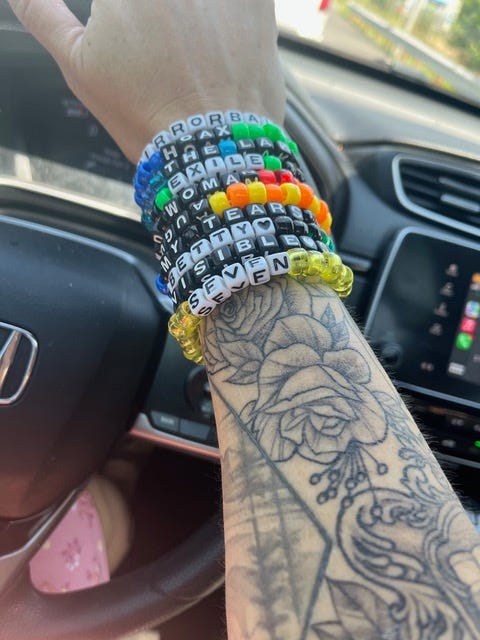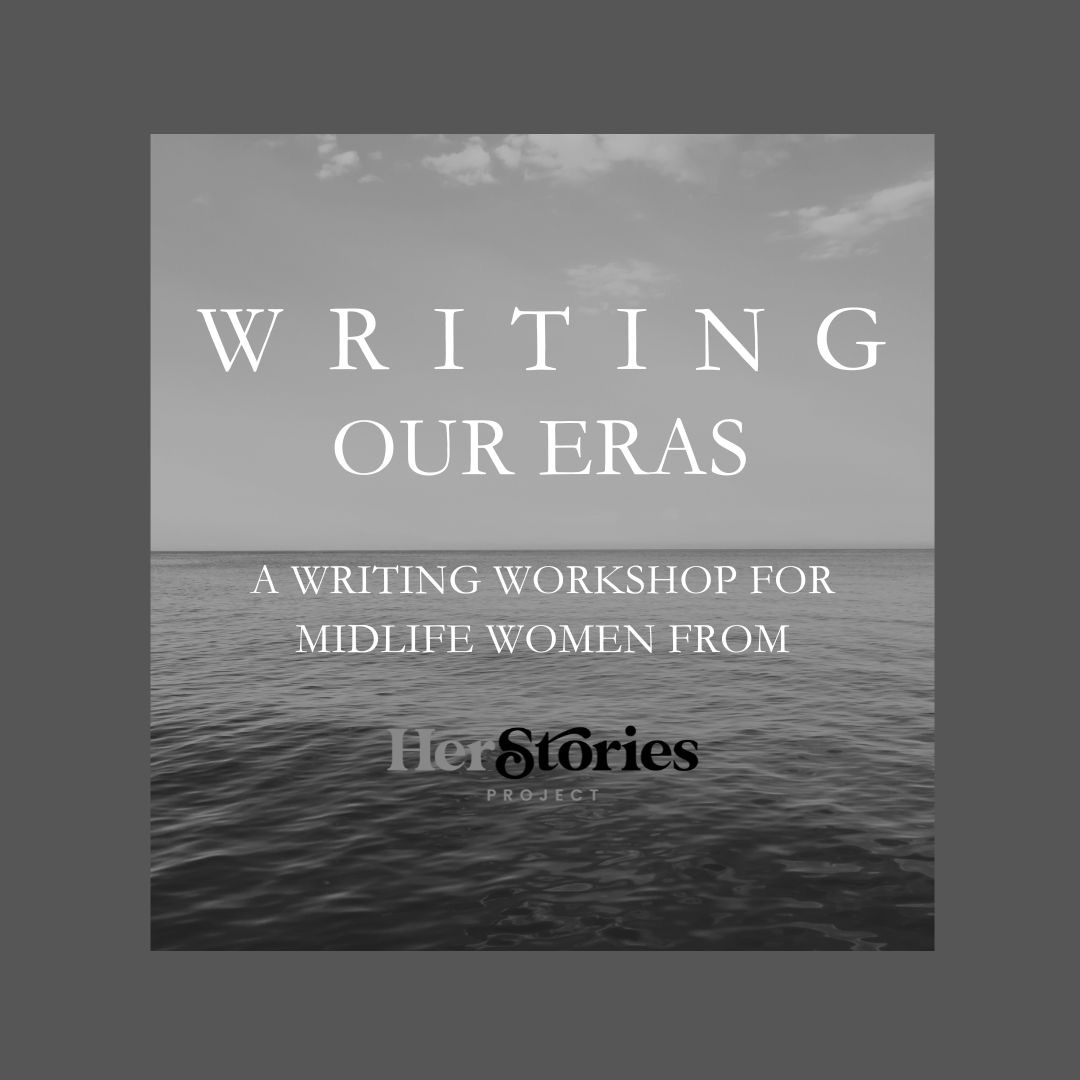The Case For Midlife As Our Tortured Poets Era
Co-editor Stephanie writes about Taylor Swift, Unapologetic Transitions, and Unrestrained Storytelling
Our Writing Our Eras workshop starts Wednesday, April 24th. Learn more here.
April 19th. My daughters and I had been counting down to this date for weeks and weeks: the day Taylor Swift released her new album, The Tortured Poets Department. I planned to wake them up early like Christmas morning so we could climb into my bed and listen together. Instead, we discovered TTPD dropped at midnight EST, so my youngest and I eagerly gathered in my bed and devoured each track, sometimes crying upon first listen (alas, that is not a dramatic exaggeration). We stayed up for an hour and listened to the whole album—or so we thought.
The next morning I shrieked as though I were a six-year-old discovering Santa had come. “Sophie! There is a whole second album! There are 31 songs!”
Yes, it’s true: at 2:00 am, Taylor released an entire second half, an Anthology. I spent most of the next 48 hours obsessively listening to TTPD Anthology nonstop. And I wept, even in public with my Air Pods in, as though watching a slow motion movie of the most heartbreaking moments in my life flash before my eyes with each song.
I wish I could tell you the moment I fell in love with Taylor Swift’s music, but I can’t remember. My first recollections of dancing in the kitchen to “Love Story” and blasting the anger-fueled, radio-popular tracks from Reputation and catchy 1989 tunes while driving were tinged with a sense of apology, like I should be embarrassed to like something so “mainstream.” I mean, I’m a writer and a music therapist: shouldn’t my standards mandate exclusive enjoyment of obscure indie artists with complex musical structure and subversive political narratives?
Fast forward to 2020 and I was a full-blown Swiftie. Folklore and Evermore’s back-to-back releases changed the way I thought about Taylor Swift’s music. I was hooked; there was no going back. Those pandemic years were the perfect time to deliciously lose yourself in the landscape of her musical storytelling; she had leveled up as a songwriter and artist. And although I was addicted to those two albums, which were less mainstream and more complex, I did a deepdive into her older work and discovered that I adored it as well.
After its 2022 release, Midnights played on repeat in our car for months—dropping kids off, picking them up, errands and road trips—we were monogamous with that album until my daughters and I began prepping for the Eras Tour by curating our Taylor playlist filled with our favorites from every album.
I joke that my girls and I were “changed on a cellular level” after attending that concert, but in all honesty, it was life-changing for the three of us. It was a mountaintop, peak moment. Partially because we felt guided through a difficult divorce by Taylor’s music as the soundtrack for a summer of grief and change. She was inadvertently our champion, our comforter, the one who rallied us and saw us and understood us.
And this is precisely why I am obsessed with Taylor Swift’s lyrics—because they are real and raw and deeply personal yet tinged with the universal, the ingredients of my favorite type of writing to read.
I love fiction, non-fiction, humorous books, and stories that make me sob. Not all writing is created equal; it isn’t supposed to be. While I enjoy learning things about relationships or life experiences with research-based, thoughtful narratives, a raw story told by an accessible and vulnerable voice is irresistible to me. And that’s one of my favorite parts of The Tortured Poets Department.
After her most recent three albums, Taylor shifted back to song lyrics that are undeniably autobiographical. Plenty of critics frowned upon the transition back to this memoir-style of writing after the fairytale, fictional, even cerebral lyrics of Folklore, Evermore, and Midnights.
In a New York Times review, Lindsay Zoladz refers to the anthology as “sprawling and often self-indulgent,” which would perhaps be less inflammatory if women didn’t already have deep seated sensitivities about coming across as “too much” or “selfish.” For certain kinds of women (cough, Midwest Gen Xers raised in the church), those adjectives are a direct path to the worst kind of wounds.
She writes, “The feverish “Tortured Poets Department” is a full-throated return to her specialty: autobiographical and sometimes spiteful tales of heartbreak, full of detailed, referential lyrics that her fans will delight in decoding. . . As the album goes on, Swift’s lyricism starts to feel unrestrained, imprecise and unnecessarily verbose.”
Well, those criticisms feel oddly familiar. I personally pride myself on being unnecessarily verbose, and while I wish I could say I am semi-unapologetic, there will always be a tinge of apology when I personally behave as “unrestrained, imprecise, and unnecessarily verbose.”
I felt myself seething as I read that review, and instead of struggling to come up with words to respond, my friend, writer Ashley Fetyko, found them for me. In a letter to the editor, she wrote:
“Ms. Reviewer (“MR”) sounds like the whiny, self-righteous critics of Swift’s yesteryear, criticizing her time spent on heartbreak, and lamenting her frequent references to bone-deep disappointment that she and her long term partner did not get married or have children. This domestic fixation clearly does not jibe with MR’s perception of “worthwhile”; she would have preferred Swift spend more time dissecting gender/power as she did on “Midnights.” MR is personally wounded Swift spends much of the album gazing inward. . . The underlying message: How dare she.
What a tired refrain, and one that presumes the legitimacy of only one experience of modern, feminist womanhood. Shame on her for perpetuating the very critique Swift’s catalogue has loudly and successfully decried.
There is room in public space for a woman’s inner life. It is alive. It matters. Haters be damned.”
For many women at midlife, we realize that we have been playing small, being quiet, and trying to be good wives / mothers / daughters / workers for our entire lives. When we awaken to this reality, when we shed skins or burn structures or mourn losses, like Taylor in her heartbreaks, we go through the stages of grief (pausing extra long on anger, perhaps) and we usually want to talk about it.
Ann Powers describes TTPD as being “written in blood” in her review for NPR: “Even in today's blather-saturated cultural environment, a woman speaking out after silence can feel revolutionary; that this is an honorable act is a fundamental principle within many writers' circles.”
I think there is another angle to Taylor Swift’s “self-indulgent” lyrics; we forget the generosity inherent in this type of self-indulgence. By reflecting her deeply personal life experiences and emotions, she gives us permission to do the same.
And when the TIME Magazine person of the year gives us permission to tell our stories, share our histories, celebrate the different versions of ourselves, and integrate all eras into one powerful self, women listen. Taylor Swift generously and vulnerably writes about the end of a relationship she envisioned would lead to marriage and babies. She opens up about her experiences with fame, the Eras Tour, the haters along the way in tracks like “I Can Do It With a Broken Heart,” “thanK you aIMee” (a nod to Kim Kardashian), and “Who’s Afraid of Little Old Me?” with lyrics like:
“They said babe, you gotta fake it till you make it,”
And I did.
Lights, camera, bitch, smile
Even when you want to die.”
“All the pieces of me shattered while the crowd was chanting “more!””
“I’m so depressed, I act like it’s my birthday everyday!”
“You caged me, and then you called me crazy. I am what I am ‘cause you trained me. So who’s afraid of little old me?”
But it’s the longing and devastation in the lyrics that reflect heartbreak that bring listeners to their knees: I should know; I was the crazy 45-year-old woman wandering around an airport openly weeping to “Chloe or Sam or Sophia or Marcus,” a song I’m certain reflects the imaginary baby names she and Joe Alwyn created for their hypothetical children.
When “loml” concluded with “You’re the loss of my life,” how many of our own hearts ached?
“I wish I could un-recall how we almost had it all.”
“Our maladies were such we could not cure them. And so a touch that was my birthright became foreign.”
“If you want to break my cold, cold heart, just say I loved you the way that you were. If you want to tear my world apart, just say you’ve always wondered.”
When we listen to TTPD, we will see ourselves in the songs. We will remember our own experiences, and maybe we will want to talk about it, or write about it, or reach out to someone we forgot about.
Apologetic women need all the Taylor Swift defiance we can get. Taylor herself explains the value of sharing these stories.
“This writer is of the firm belief that our tears become holy in the form of ink on the page,” she wrote on Instagram. She has talked about this album as if the songs were mere monuments to her suffering: “Once we have spoken our saddest story, we can be free of it.”
I couldn’t agree more; after all, I am clearly in my Tortured Poets Era. Are you?
We hope you’ll join us in sharing your stories, in turning inward, in remembering and writing our eras over the next four weeks. Our Writing Our Eras Tour workshop starts tomorrow.
*Midstory Magazine get 22% off by using the code “ERASAPRIL”








This is fabulous! It really speaks to that critical voice in my head telling me only certain feelings are worth writing about. Now I am questioning that voice. Thank you.
Love this ... "I mean, I’m a writer and a music therapist: shouldn’t my standards mandate exclusive enjoyment of obscure indie artists with complex musical structure and subversive political narratives?"
Relates to a note I shared this week in which I said: I remember in high school always feeling like I never knew obscure enough bands to fit in with the people who didn’t fit in 🤣 returning to grad school in my forties I love that I feel absolutely no need for pretension and own all of my parts including both the obscure and super mainstream interests. My seventeen year old self wouldn’t get it but I am glad to show her it’s actually okay.